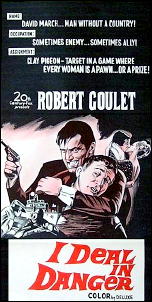Plot
In Nazi Germany during World War II, David March (Robert Goulet) is an American traitor who has been given wide access to travel as he wishes within Germany. Unbeknownst to the Germans, March is actually an American spy, the last remaining from a spy ring, known as Blue Light. As time goes on, he has been able to work his way higher and higher within the Nazi intelligence apparatus, however he is suspected by a Nazi Gestapo officer, Captain Elm (Werner Peters). Along the way, he meets Susanne Duchard (Christine Carère), a French agent, with whom he has a romantic interlude and persuades her to help him.
Elm fosters a plan to expose March by taking him to Spain to meet with a British scientist, Guy Spauling (Donald Harron), who wants to defect to Germany. Elm knows that Spauling is a British agent. Spauling asks March to kill him, in order to validate March's standing with the Gestapo, but March instead uses the opportunity to frame Elm as the Blue Light agent, and kills him.
March's goal becomes the destruction of secret Nazi weapons factory, which produces missiles for U-boats. He has romantic interludes with a German scientist, Gretchen Hoffmann (Eva Pflug), working at the missile factory, convincing her to assist in his plans to blow up the facility. March and Duchard escape the destruction of the plant, but Hoffman dies in the explosion.
This page is based on this
Wikipedia article Text is available under the
CC BY-SA 4.0 license; additional terms may apply.
Images, videos and audio are available under their respective licenses.
